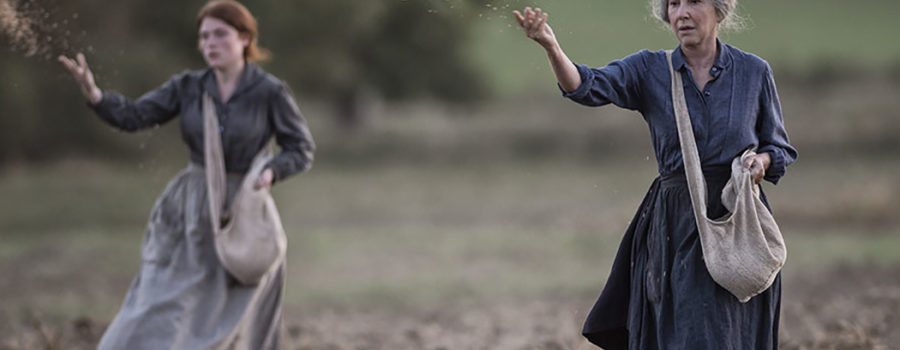[Published at Film Inquiry] Les gardiennes explores the important roles that women play during wartime. Before women were allowed to fight in the military, they would play an equally important role at home, including filling in for the jobs that the soldiers left behind and caring for the children and elderly; essentially, in many instances, they would keep everything at home from falling apart, particularly in the case of Les gardiennes. Set in a rural village in the Limousin countryside of France during World War I, between 1915 and 1920, the film follows the women of the Sandrail family as they tend to the family farm while the men of the family fight.
Beauvois, Marie-Julie Maille, and Frédérique Moreau adapted Les gardiennes‘ screenplay from the eponymous Ernest Pérochon novel. Although it moves along at an incredibly sluggish pace, Beauvois manages to keep the viewer engaged through his delectable direction, breathtaking images of the Limousin countryside, and with the help of several outstanding performances from his cast of leading women.
A Fancy Fable Of A French Family Of Female Farmers
Hortense (Nathalie Baye) is the proud matriarch of the large, extended Sandrail family. Honest and hardworking, the family runs a profitable farm in the Limousin region. Hortense does every task; she cooks, cleans, farms, and everything in between. Henri (Gilbert Bonneau), the patriarch, occasionally helps out, but mostly only watches on account of his poor health.
With the men abroad fighting the Germans, there simply aren’t enough people to maintain the crops, especially during harvest time. As such, Hortense hires a worker extraordinaire named Francine (Iris Bry), who turns out to increase productivity significantly.

There is a rather complicated intertwinement of love triangles in Les gardiennes. The Sandrail family trades with the stationed Americans while they await their war assignments, which creates a bit of sexual tension between the women waiting for their husbands to return home and the soldiers. Solange (Laura Smet) is the eldest daughter in the family. She becomes distracted by one of the soldiers as she struggles to do the right thing. Her husband, Clovis (Olivier Rabourdin), ran the farm before the war. Now, however, he is a P.O.W. Marguerite (Mathilde Viseux) is the youngest, adoptive daughter. She has an unrequited love for Georges (Cyril Descours), the youngest son, who falls for the appealing Francine.
Georges and the eldest son, Constant (Nicolas Giraud), intermittently visit the farm on small periods of leave from battle over the years, intensifying the drama and suspense, as the audience doesn’t know if it will be their last time visiting or not. Georges and Francine write love letters back and forth to each other, much to the dismay of Marguerite. As the Americans continue to visit the farm, talk circles around town. However, the Americans help with efficiency around the farm.
Tending To The Farm, Increasing Yield
Throughout Les gardiennes, the Sandrail women and Francine increase yield, year after year, working inside and outside of the house as they wait in agony to find out the next news of their loved ones at war. As the women tend to the farm over the years, we notice that, as a result of the presence of the Americans, that the technology with which they use to plough and sow their crops changes, becomes more efficient. This further increases yield. They begin using McCormack and Fordson motor tractors and other more relatively modern equipment, instead of handheld tools and old plough machines carried on wheels by horses.

Year after year, harvest after harvest, Francine sticks around with the family, until she is essentially an honorary member. An orphan, previously drifting from place to place, she takes as much pride in her work as the rest of the farmers do; she truly feels as though she is a part of the Sandrail family. Rightfully so, as she is a big reason the farm is running so well. Beauvois films the women toiling in the Limousin sun for extended periods of time throughout the film, painstakingly painting the picture in the viewers’ minds of how hard it is to actually tend to a farm 24/7 without modern technology.
The Emotional Toll At Home & At War
War is hell. There’s no doubt about that statement. While the women run the farm at home, they struggle to maintain morale. At any moment, they could receive news that any one of the three men in the family has been killed in action. When Solange discovers that Clovis has been taken as a P.O.W. by the Germans, it nearly destroys her. Imagine knowing that a loved one is being held captive by a hostile enemy and not being able to do anything about it.
There are scenes of sorrow, grief, shame, relief, joy, and redemption that showcase Smet, Baye, and Bry‘s respective ranges. They turn in a trio of masterclass performances that carry Les gardiennes.

Perhaps Baye‘s Hortense suffers the most. She has two sons and a son-in-law at war, one of which is a prisoner of the Germans. Nevertheless, the women of the farm and Henri keep moving forward and doing what they can. Clovis visited once before he was captured. As everyone noticed, he wasn’t himself; he was distraught and drinking heavily. On the front lines, they give you alcohol to boost your courage. When Georges visits, he begins to suffer from night terrors and exhibits a short temper. He and Constant suffer from PTSD. Beauvoismakes sure to show the emotional costs of war as well as the more readily apparent physical tolls.
Les Gardiennes: Sip It Slow Like A Fine Wine
Three-time Oscar winner Michel Legrand‘s (Yentl, Summer of ’42, The Thomas Crown Affair) score is magnificent. It harkens back to a bygone era when Bernard Herrmann and Jerry Goldsmith reigned supreme. The wind-heavy orchestra flows well with Beauvois‘ dreamlike shots of the countryside. It’s an exclamation point on a nearly seven-decade career. Beauvois is a patient director; he will wait until that perfect shot of the sunrise through the trees, or until the fog encapsulates the entire farm as if to suffocate it. Caroline Champetier, who shot Beauvois‘ Of Gods And Men, lights every frame with a luminescent glow and has a wonderful eye for detail.
Ultimately, even at an extended 138 minutes, the snail-pace of Les gardiennes doesn’t get in the way of the film. Just embrace the pace. IN fact, the audience was thoroughly engaged in the drama of these women’s lives, what would become of the farm and the family, and who would end up together. Les gardiennes is another gracefully-directed film by Beauvois, and it gifts the audience with another perfect arrangement from Legrand, three gripping performances from Smet, Bay, and Bry, and plenty of eye-catching imagery to make up for its lagging pace.
Do you enjoy period pieces? Do you think a score is important to a film? Are you a fan of Beauvois’ work?
Les gardiennes opens theatrically in the U.S. on May 4, 2018. For more information on its release, click here.
Opinions expressed in our articles are those of the authors and not of the Film Inquiry magazine.








Leave a Reply
Your email is safe with us.